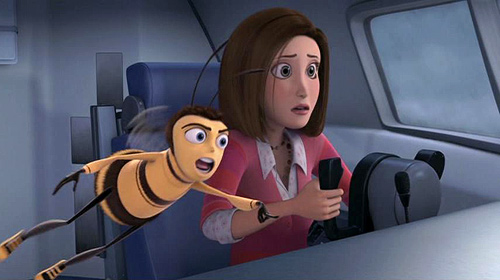And then someone in the environmental movement will invoke DDT. Really, the EPA was not created 40 years ago to protect us from corporations and their chemicals, it was created to stop science policy from being done by anecdote, like happened with DDT. But the EPA is still a political body at the top, so when the president tells his appointed employee that he wants to call a special scientific panel on a topic, they are going to salute and be on the way. Then a bureaucrat is going to tell career scientists at the EPA to do a bunch of new work, even if they just finished doing it it a year ago.
That's not scientific governance, it's seagull management, where someone flies in, makes a lot of noise, craps all over everything, and flies back out. But that's reality and in this case, it may be a benefit. Because 4 years from now when a plan is drafted, we probably won't have a bee problem any more.

Bee Movie. Link: jimhillmedia.com
The president declared he wants to protect bees. Hey, I am all for protecting bees, they are an indicator species, they are pollinators and a valuable part of the ecosystem. But protect them from what? Winter? They aren't dying off in droves, this has been well-covered, here and here and here, and then on Forbes and too many places to count.
Bees are dying in one region of Europe but in the 11 countries where 75% of the bees are, they are not - that means it can't be the pesticide everyone uses. France being France banned it for corn seeds - but then says people can spray it. Why? Because they took anecdotal evidence about bee deaths and matched them to places where seeds were sprayed with neonics.
Because the president is now involved, environmentalists are doing a full-court press, and farmers rely on food for their livelihood, so they certainly want to know real answers. Mike Adams, host of the nationwide Agri-Talk radio program, had me on again to help separate reality from Bee-S. I can't take credit for that Bee-S thing, that was American Council on Science And Health when they linked to my last article. You can listen below:
The take home messages:
(1) Neonics are systemic pesticides, they are taken up by the whole plant. That is far better than a contact pesticide, which stays only on the surface. Neonics have led to reduced pesticides because it needs fewer applications. That has been really terrific for the environment.
(2) Science keeps food reasonable in cost. American people can afford to be fat, something not done in the history of the world, for the simple reason that American agriculture has successfully 'dematerialized' in the last few decades: more food on less land with less strain on the environment. Going back to 1990s pesticides would mean a $4 billion hit, higher CO2 emissions due to more intensive farming, and fewer jobs.
I care about the environment, so do you. So does, I believe, the president. By tasking the EPA with coming up with a plan to save the bees, he tasks them with separating fact from fiction.
And that is a good thing, because they are not going to let DDT scientization of politics happen ever again.




Comments